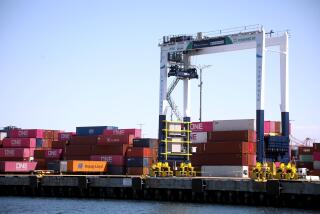Germany’s BMW Puts Lots of Green Into Prototype to Break Fossil-Fuel Chain
- Share via
BERLIN — Finally, the answer to every guilt-ridden driver’s dream of a car that is swift and showy, yet as environmentally correct as walking. So why isn’t anyone buying?
When BMW rolled out 15 sleek silver hydrogen-powered sedans here last week to promote their rather limited market debut next month at the Expo 2000 world’s fair in Hanover, the move was more to provoke the leftist government here into investing in alternative-fuel development than to catch competitors off guard.
In fact, the Munich manufacturer sent few tremors through the sales departments of Volkswagen or DaimlerChrysler by announcing that it is now ready to deliver hydrogen-powered cars to the consumer.
With only two fueling stations in Germany and per-mile driving costs nearly four times those of conventional autos, there remains neither the needed infrastructure nor the market for the 12-cylinder 750 hL, even with BMW subsidizing its $90,000 sticker price to compete with other full-size luxury models.
“It’s a bit of the chicken-or-the-egg dilemma,” says Fritz Vahrenholt of oil company Deutsche Shell, which is collaborating with BMW and other car makers to bring to market the alternative fuels needed to power pollution-free cars.
“If we have the fuels, we’ll get investment in the car development, but we need the cars to justify a fuel market.”
Nowhere does “individualized mobility”--as manufacturers call the personal car--clash so loudly with environmental concern as in the car-making bastion of Germany, especially since the Greens party joined the federal government 19 months ago and slapped an “eco-tax” on gasoline as its first order of business.
Germany’s auto and energy industries now say it’s time for the Berlin leadership to make good on its promise to use those billions in annual revenue to halve carbon dioxide emissions by 2008 and help drivers break the fossil-fuel habit.
“We chose Berlin as the venue for our launch to make clear to politicians that we, the industry, are ready for this, and we want them to have a clear signal that we expect them to act,” says BMW’s Berlin director, Johannes Neukirchen.
But federal transport and budget authorities insist that it is too early in the hydrogen-powered car’s development--with no more than a few thousand expected on the road for the next decade--to talk about tax exemptions or state subsidies to build a network of fueling stations for hydrogen-powered cars.
Experts on environment and energy issues also say government price supports would give an unfair advantage to whatever car maker is furthest along in the technology’s development--in this case, BMW, hardly a company associated with those in need.
“The automobile and energy industries should themselves make the investments in the beginning, because they will be the ones to profit later,” says Mathias Samson, parliamentary spokesman for the Greens. “Selective subsidies are questionable because the first producer to reach the market would make a fortune.”
The government has already invested $70 million in research and development of hydrogen technology but has stopped short of getting involved in fuel production because of the costs and storage risks, says Frank Bonaldo, spokesman for the federal Ministry for Economics and Technology.
Volkswagen and DaimlerChrysler have concentrated on developing fuel cells that produce electricity to drive a vehicle by converting hydrogen and oxygen without combustion. As with the hydrogen-propelled motor, water vapor is the only emission from cars using fuel cells. But they aren’t expected on the market until 2004.
Cars that can run on “bio-diesel”--a plant derivative--as well as conventional fuel have been rolling off Volkswagen’s production line since 1996, and the Wolfsburg manufacturer of the people’s car also offers the greenest wheels on the mass market with its new tiny-engined Lupo.
“We want to produce cars for sale and use, not just for showing,” VW spokesman Harald Fletcher says.
And until the government and industry draft a common strategy for making the hydrogen-powered car a functional option, the 15 showroom models now cruising this capital are likely to remain virtual prototypes, even if they are formally on the market.







